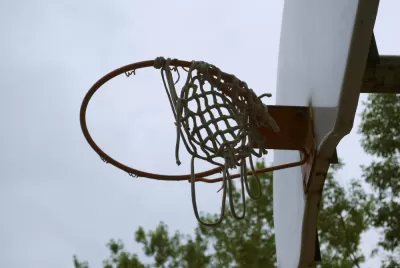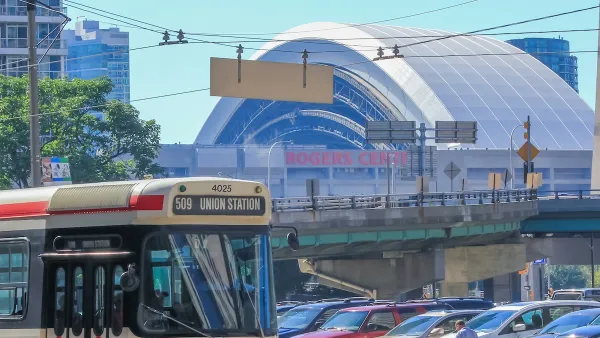Noise and drug dealers are two reasons to remove city-owned basketball hoops every day. Or you could give the public resources for fun and exercise in place, which is what Toronto decided to do this week.

"It took one viral video — boys throwing a basketball at an empty backboard in broad daylight — to halt a long-standing city practice," reports Jennifer Pagliaro.
The city spent about a decade removing rims from city-owned basketball courts until the video woke the public up to the punitive and counter-productive nature of the practice.
The practice began in 2008 as a response to noise complaints from residents living near city basketball courts. City spokesperson Brad Ross said in a statement that noise complaints will be addressed on a case-by-case basis in the future.
“Having a big city is a balancing act all the time,” Mayor John Tory told reporters Thursday morning. “I think that what happened, as often happens in cases like this, is that balance was lost, in that I can understand 10 o’clock at night people maybe — or 11 o’clock at night — saying that they’re concerned about noise. But at 6 o’clock in the evening or even 9 o’clock in the evening at this time of year we should be doing everything we can to get as man kids as possible to be playing basketball in our public parks.”
Tory said residents can’t assume they will live free of noise in a city like Toronto and said there is a need to have “healthy, positive” activities for youth.
Focusing on noise might only tell part of the story, however. Pagliaro also notes that rims were originally removed as a deterrent against "drug dealers."
FULL STORY: After viral video, city halts long-standing practice of taking basketball rims down at some public courts

Maui's Vacation Rental Debate Turns Ugly
Verbal attacks, misinformation campaigns and fistfights plague a high-stakes debate to convert thousands of vacation rentals into long-term housing.

Planetizen Federal Action Tracker
A weekly monitor of how Trump’s orders and actions are impacting planners and planning in America.

In Urban Planning, AI Prompting Could be the New Design Thinking
Creativity has long been key to great urban design. What if we see AI as our new creative partner?

King County Supportive Housing Program Offers Hope for Unhoused Residents
The county is taking a ‘Housing First’ approach that prioritizes getting people into housing, then offering wraparound supportive services.

Researchers Use AI to Get Clearer Picture of US Housing
Analysts are using artificial intelligence to supercharge their research by allowing them to comb through data faster. Though these AI tools can be error prone, they save time and housing researchers are optimistic about the future.

Making Shared Micromobility More Inclusive
Cities and shared mobility system operators can do more to include people with disabilities in planning and operations, per a new report.
Urban Design for Planners 1: Software Tools
This six-course series explores essential urban design concepts using open source software and equips planners with the tools they need to participate fully in the urban design process.
Planning for Universal Design
Learn the tools for implementing Universal Design in planning regulations.
planning NEXT
Appalachian Highlands Housing Partners
Mpact (founded as Rail~Volution)
City of Camden Redevelopment Agency
City of Astoria
City of Portland
City of Laramie



























